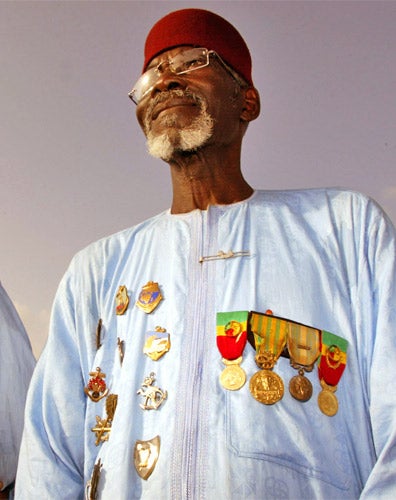After 65 years, France finally honours its colonial soldiers

After years of broken, or half-kept, promises, France is to give full military pensions to all surviving colonial soldiers who fought for French freedom during the Second World War.
President Nicolas Sarkozy announced that there would be an immediate end to discrimination in military pension payments to French veterans who are now citizens of other countries. The decision will boost tenfold the payments to around 30,000 Second World War veterans from former French colonies in Africa.
In a speech at the Elysée Palace to senior African military officers, Mr Sarkozy said that he wanted to "bear witness to our undying gratitude to the veterans from your countries, who will now receive the same pensions as their French brothers in arms".
He did not explain why it had taken 50 years for the French state to express its "undying gratitude". When French colonies achieved independence in the late 1950s and early 1960s, French military pensions to their veterans were frozen. By 2006, a French veteran was receiving €690 a month. An African or North African veteran was still receiving the 1960s level pension of €61 a month.
Years of complaints, and legal rulings against the French state came to nothing until the appearance in 2006 of the film Indigènes about five North African soldiers who took part in the liberation of France from the Nazis in 1944. After seeing the film, the then President, Jacques Chirac, promised that he would "do something".
Pensions to thousands of French colonial veterans with a "combatant's card" were raised to the French level in 2007. About 30,000 other veterans, with other types of military pension, remained frozen at the early 1960s level.
The French state's constitutional watchdog, the Constitutional Council, ruled in May that this infringed the republic's commitment to égalité – unless veterans of French nationality living abroad also had their pensions reduced. More than half of the French "liberation" army of 1943-44, which fought in Italy and France, was of African origin. There were 134,000 Algerians, 73,000 Moroccans, 26,000 Tunisians and 92,000 men from colonies in sub-Saharan Africa.
This multiracial army was first thrown into battle in Italy in 1943. The same troops landed with US forces in the south of France on 15 August 1944, while the main German occupying force was engaged in Normandy.
Mr Sarkozy made the announcement to coincide with the presence of thousands of African soldiers from former French colonies in today's 14 July military parade on the Champs Elysées.
But, as one controversy ended, another opened. Civil rights and African political opposition groups protested against the presence of African armies which have taken part in coups or the repression of democratic movements.
The contingents marching down the Champs Elysées – to commemorate a half century of independence – will include soldiers from 13 of the 14 former French colonies in Africa. Elois Anguimate, a philosophy professor and a Central African republic opposition leader, said: "I know what the 14 July represents [the start of the French revolution] and I don't understand why this date is being used to honour armies which symbolise oppression... The soldiers will march then they will go back home and carry on their depradations against the people."
The Paris-based International Federation for Human Rights has asked for the names of all the senior African politicians and army officers who have accompanied their soldiers to Paris. Its president, Patrick Baudoin, said he feared that many of the French state's guests had been involved in torture or war crimes. "We have run into a brick wall," he said. "The French authorities don't want any embarrassment for guests who may also be torturers."
Subscribe to Independent Premium to bookmark this article
Want to bookmark your favourite articles and stories to read or reference later? Start your Independent Premium subscription today.

Join our commenting forum
Join thought-provoking conversations, follow other Independent readers and see their replies